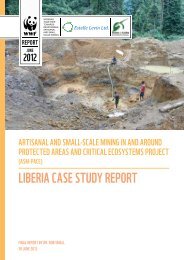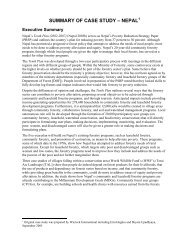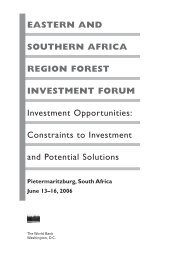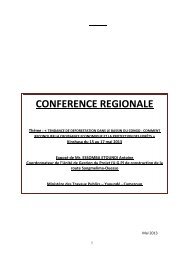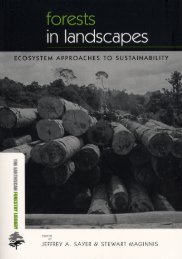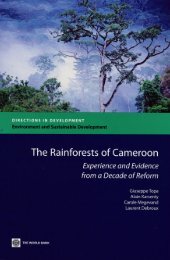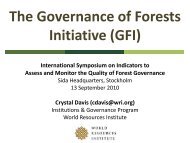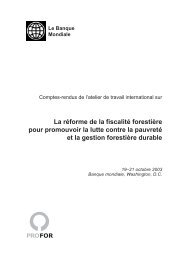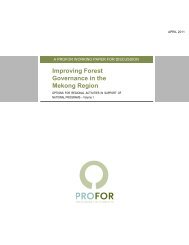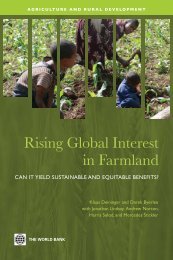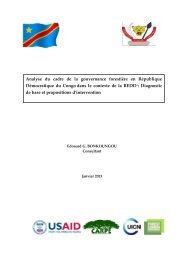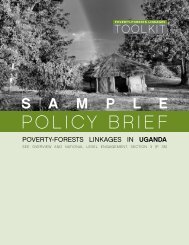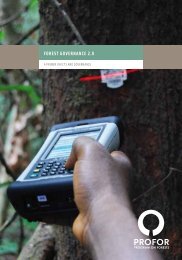Managing the Miombo Woodlands of Southern Africa - PROFOR
Managing the Miombo Woodlands of Southern Africa - PROFOR
Managing the Miombo Woodlands of Southern Africa - PROFOR
You also want an ePaper? Increase the reach of your titles
YUMPU automatically turns print PDFs into web optimized ePapers that Google loves.
TABLE 4.1. OPPORTUNITIES AND CONSTRAINTS FOR IMPROVEMENT IN MIOMBO MANAGEMENT<br />
APPROACH POTENTIAL IMPACTS CONSTRAINTS AND DRAWBACKS<br />
Devolving rights and<br />
responsibilities for<br />
woodland management to<br />
<strong>the</strong> local level<br />
When devolution is complete,<br />
<strong>the</strong> first outcome<br />
is <strong>of</strong>ten, effectively,<br />
closure and woodland<br />
regeneration. There can be<br />
strong local redistributive<br />
impacts.<br />
Closure creates winners and losers; objections <strong>of</strong> o<strong>the</strong>r stakeholders<br />
may limit potential; strong need for conflict management<br />
mechanisms in socially and economically heterogeneous<br />
communities.<br />
Policy and legislation may not be conducive to devolution; forestry<br />
may not have a high enough pr<strong>of</strong>ile to bring about policy change or<br />
<strong>the</strong> budgets needed to accomplish devolution.<br />
Local capacity for woodland management may be weak.<br />
National institutions may have limited ability to work with communities<br />
to provide guidance.<br />
Incomplete devolution can create opportunities for elite capture<br />
and political interference.<br />
Low margins and few markets for woodland products may give<br />
limited incentives to improve management<br />
Organizing transfer payments<br />
to individuals and<br />
communities in exchange<br />
for providing environmental<br />
services<br />
Increasing <strong>the</strong> value <strong>of</strong><br />
woodland production<br />
through market development<br />
can create increased<br />
value-addition and new<br />
products.<br />
Well-designed schemes<br />
reduce <strong>the</strong> incentive<br />
for land clearance and<br />
overexploitation <strong>of</strong> miombo<br />
resources, and can encourage<br />
regeneration. Can<br />
contribute to household<br />
income and reduce impact<br />
<strong>of</strong> shocks from ill-health<br />
and environment stress.<br />
Generates higher incomes<br />
for poor rural households,<br />
and increases <strong>the</strong> incentive<br />
to better manage<br />
woodlands for multiple<br />
outputs.<br />
Markets for environmental services are poorly developed.<br />
Leakage: reduced exploitation in one area may simply shift<br />
exploitation to ano<strong>the</strong>r area.<br />
Need to integrate PES schemes with a range <strong>of</strong> o<strong>the</strong>r servicedelivery<br />
investments.<br />
Weak local and national capacity for working with communities in<br />
meeting <strong>the</strong>se particular objectives.<br />
Policies and legislation may not support <strong>the</strong>se types <strong>of</strong><br />
interventions.<br />
Significant market development requires investment capital.<br />
When lucrative markets are developed for miombo products, raw<br />
material oversupply can limit household revenue potential<br />
When rights to resources are unclear, elite capture can threaten<br />
<strong>the</strong> viability <strong>of</strong> value-added schemes<br />
Government is poorly placed to aid in product-specific market<br />
development, but can focus on wider policy and legal framework to<br />
encourage forest-based SMEs.<br />
Private sector with <strong>the</strong> capacity for market development is thin.<br />
Limited local marketing channels for new products require<br />
institutional investments that may be beyond <strong>the</strong> capacity <strong>of</strong> <strong>the</strong><br />
private sector.<br />
Forest policy and legislation may prohibit <strong>the</strong> sale <strong>of</strong> forest<br />
products outside <strong>of</strong> <strong>the</strong> conventional regulatory regime.<br />
Trade-<strong>of</strong>fs between extractive and consumption management<br />
options are likely, which will require mediation and conflict<br />
management.<br />
56 MANAGING THE MIOMBO WOODLANDS OF SOUTHERN AFRICA



